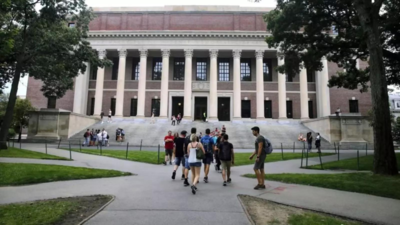- News
- World News
- US News
- Reinstated international students at risk again after new ICE memo on SEVIS terminations
Trending
Reinstated international students at risk again after new ICE memo on SEVIS terminations
A new ICE memo threatens international students whose SEVIS records were recently reinstated, potentially creating gaps in their records and jeopardizing their legal status. This policy allows for SEVIS termination based on visa revocations, raising concerns about due process and potential deportation. Immigration attorneys anticipate legal challenges to address these issues and protect students from adverse consequences.
International students whose SEVIS records were recently reinstated may once again find themselves in trouble due to a new internal memo issued by Immigration and Customs Enforcement (ICE).
Charles Kuck, founding partner of Kuck Baxter, an immigration law firm, explains, “It turns out that ICE did not ‘unrevoke’ the SEVIS registration to the date of their mess up (aka the date of termination of the record). They reinstated it as of April 24. That means these international students now have a gap in their SEVIS records, which, according to ICE's new policy renders them out of status during that time.”
Being out of status can lead to serious consequences. These include being barred from re-entry for a certain period (3 or 10 years) based on the length of unlawful presence, potential deportation, and difficulties with future visa applications.
Poll
Do you think the new ICE memo will negatively impact international students?
According to a copy of this memo reviewed by TOI, it provides specific guidance to the Student and Exchange Visitor Program (SEVP) managers to terminate SEVIS records. These can be terminated on various grounds such as failure to report employment while undergoing Optional Practical Training (OPT), on approval of a change of status from F-1, failure to comply with the terms of the F-1 visa, withdrawal from the educational institute and ‘revocation of a visa by the Department of State (DOS)’.
The memo states that: “ A terminated record in SEVIS could indicate that the non-immigrant no longer maintains F or M status.” F visas are granted for academic studies and M visa is for vocational studies. However, it also states that termination does not necessarilyresult in adverse consequences—a position that has been legally contested and has resulted in temporary restraining orders being passed in favour of the international students by several district courts. On SEVIS termination, ICE may conduct further investigation or initiate removal proceedings, explains the memo.
The memo also states that “DOS may at any time, in its discretion, revoke an alien’s visa. DOS can consider derogatory information provided by ICE and other US law enforcement agencies in its assessment of whether visa revocation is appropriate for an alien. When DOS revokes an alien’s visa with immediate effect, ICE should take steps to initiate removal proceedings.” It also provides that if DOS revokes a non-immigrant visa with immediate effect, SEVP must terminate the SEVIS record, as such revocation can serve as a basis for removability.
In the backdrop of this memo, Greg Siskind, founding partner of Siskind Susser, an immigration law firm said, “We are expecting a lot of people who were reinstated to once again have their SEVIS terminated. In short, ICE says they will terminate whenever DOS revokes a visa. And DOS will revoke a visa for phantom reasons with no due process to address why revocation happened. The Trump Administration is counting on the argument that nothing DOS decides is reviewable by a court.”
As was reported by TOI, in its edition of April 26, terminated SEVIS records of international students were suddenly showing ‘active status’. SEVIS is the web-based information system that the US agencies use to track and monitor international students during their duration of study. When the SEVIS terminations commenced in late March/early April, many students—mostly Indian—were advised by their Designated School Officials (DSOs) to leave the US. Several students stayed back and filed lawsuits.
ICE officials in various court hearings cited that the agency was restoring the SEVIS records and that it was developing a policy framework for SEVIS record terminations. “Until such a policy is issued the SEVIS records will remain active/will be reactivated. ICE will not modify the SEVIS records solely based on the National Crime Information Center (NCIC) finding that resulted in the recent SEVIS terminations…,” it stated. NCIC is a central database for crime-related information maintained by the Criminal Justice Information Services Division (CJIS) of the Federal Bureau of Investigation, which provides access to various US law enforcement agencies.
However, the ICE-memo that has now been issued, has added another twist. Key questions now facing international students include: Will the SEVIS reactivations be considered retroactive? Does the period between termination and reinstatement constitute unlawful presence? Are students still at risk of detention or deportation? According to immigration attorneys, class action suits and individual lawsuits that will be filed in the days to come, will seek answers.

About the Author
Lubna KablyEnd of Article
Follow Us On Social Media








